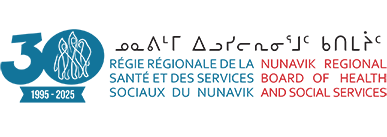NRBHSS Funding & Support
The NRBHSS Prevention and Health-Promotion team offers support to local organizations to run food projects that contribute to food security, health and well-being. The NRBHSS can provide in-person support, funding, training and resources (tool kits, recipes, etc.).
Local initiatives that qualify for funding and support should aim to target one or more of the following three objectives:
- Improve knowledge and skills to grow, harvest, preserve, choose or prepare food
Examples include: activities where people come together to learn traditional and modern ways of preparing country food, to learn new recipes with healthy food or how to grow vegetables in the North, would fit under this objective.
- Support people to have better access to quality/nutritious foods
Creating a community kitchen where people cook large quantities of hearty, healthy meals for themselves and their family, providing healthy meals or locally grown vegetables to elders and low-income families, marketing them at affordable prices to community members or organizing gatherings that break isolation while providing nutritious meals are a few examples of activities that would meet the criteria.
- Contribute to a stronger local food system
Examples include: creating new jobs or volunteering opportunities as part of the proposed food project, developing/improving basic infrastructures to have more nutritious food sourced locally, reducing food waste (i.e., composting, utilizing food donations from stores, cooking with all parts of animals) and developing strong partnerships with local food producers and harvesters, as well as other organizations working on food programs.
Your project must prioritize one or more of these objectives to be eligible for funding. Additional objectives and activities targeting health and well-being can definitely be part of your project proposal.
If your project is mainly an on-the-land initiative, we encourage you to apply to the NRBHSS Nunami – On-the-Land Program.
Funding Details
Amount Available
Maximum per project: $50,000/year
Projects requesting $30,000 and more should target all three objectives (skills and knowledge building, access to healthy food and improve the local food system, see page 1).
Eligible Expenses
Eligible expenses can include:
- Salary for a local coordinator, a local project manager, a cook, babysitters, etc. (under the payroll of a local organization)
- Honorarium for a knowledgeable speaker/instructor
- Healthy food from stores and country food
- Cooking equipment and serving equipment (containers, utensils, etc.)
- Appliances (stove, fridge, etc.)
- Gardening materials and soil, including material to build cold frame gardening boxes
- Small growing systems
- Gas (for food delivery)
- Rental fees (e.g., trucks, equipment, room for activities)
Other expenses may be eligible. Contact an officer for more information.
Not eligible:
- Infrastructure expenses (building construction or maintenance, vehicles, etc.)
- Junk food, cigarettes, alcohol
- Cash prizes
- Salary of an employee who organizes or participates in activities as part of their job function
Terms
Non-profit organizations, Family Houses, municipalities and health centres can apply. An individual or group of citizens who want to apply need to find a local organization that will agree to administer funding.
- Schools should apply to their Healthy School program first by sending a request to the Healthy School Officer. If additional funding is needed, the Healthy School Officer (KI) will forward the funding request to the NRBHSS.
- Profits are not allowed through sale of food or services. In the case where meals or food are sold, the money must be reinvested into the project.
- There can be more than one project per community if they have different objectives or target a different clientele.
- Funding will be confirmed yearly and the application needs to be renewed every year.
- Funding for local food projects will be available for at least the next four years.
- An activity and financial report must be submitted twice a year (mid-term & end-term). A template will be provided.
- Organizations can apply at any time during the year, however – people are encouraged to apply as early as possible in the fiscal year (from April to June).
- Terms may be subject to change in the coming years to adapt to the number of requests received.
Training, Support & Additional Resources
The NRBHSS Prevention and Health-Promotion team can also offer:
- Technical support to plan and run the project: develop project objectives and budget, information about other funding sources, support for accounting and reporting.
- Technical support to evaluate the impact of projects.
- Yearly gathering and training for local food initiatives that contribute to food security, health and well-being.
- On-the-job training and workshops for staff who run initiatives (cooking, food hygiene and safety including MAPAQ food-handler certification, nutrition tips, gardening).
- Tool kits and resources: recipes, nutrition factsheets, how to start a community kitchen.
Contact
Jordyn Stafford
foodsecurity.nrbhss@ssss.gouv.qc.ca
1. A small amount for improving infrastructures that can contribute to improving access to healthy food could be made available for your project (e.g. greenhouse, minor renovations of kitchen space). Contact an Officer for more information.
